- Home
- Gerald Hammond
The Revenge Game Page 3
The Revenge Game Read online
Page 3
‘Just that.’
‘I still don’t understand,’ Keith said, ‘why you felt it necessary to come busting in here at crack of dawn.’
‘Sometimes you go off for days at a time, leaving Mrs Calder in charge – especially when the geese are in season. And the last time that I asked Mrs Calder for a sight of your books I got an earful of abuse from you.’
‘Geese may be in season, but they’ll not be arriving hereabouts for a month or two yet,’ Keith said. ‘What’s so urgent about my records of a sale which I registered with you about a year ago?’
The chief inspector looked at him mildly, but there was a trace of native guile deep in the dark eyes. ‘I have the right to inspect your records at any time,’ Munro said. ‘I have said more than I need to.’
Keith opened his mouth to reply, but Sir Peter spoke first. ‘There’s something off-beat here, Keith,’ he said. ‘I think that you should hold your whisht for now, and take Ralph Enterkin along when you go to show the chief inspector your books.’
There was a moment of tense silence. Ralph Enterkin was the local solicitor who acted for Sir Peter and for Keith. The soft working noises resumed.
‘I was just wondering who would be the first to say that,’ Munro said at last. He seemed not at all put out, indeed his long face seemed to be touched with dour enjoyment. ‘Perhaps, after all, I should tell Mr Calder a little more, in the presence of you all. Assuming that the skeleton was indeed Mr Frazer’s, it belonged to a very nasty old bodach. I remember him only too well; we had complaints about him by the dozen. A drinker and a lecher, never quite honest, spiteful and quarrelsome. You, Miss Weatherby, you had high words with him, did you not?’
‘Disgusting old goat!’ said Janet.
‘Careful,’ Sir Peter said.
‘Did you mean George Frazer or Mr Munro here?’ Ronnie asked Janet.
The chief inspector flushed. ‘I’ll come to you in a minute, Mr Fiddler,’ he said. ‘Now, Miss Weatherby?’
‘I don’t mind telling you,’ Janet said reasonably. ‘The old stinker made a pass at me.’
‘Under threat of telling your father about some carry-on of yours with one of the local lads?’ Keith had the impression that Munro was watching him out of the corner of his eye.
Janet was pink but game. ‘Some such damned lie. I told him to go and try it on with someone his own age.’
‘Or you’d “blow his stupid head off”?’
‘I may have said something like that.’
‘Or you may not,’ Sir Peter said anxiously.
‘Or I may not.’
Munro nodded, satisfied. ‘Just so. You had your shotgun with you at the time?’
‘I have standing permission to shoot the rabbits in the gorse bushes at the back of the Canal Cottages,’ Janet said. ‘If I’d shot him, I’d have shot him with my gun. I’ve never fired a pistol in my life.’
‘Perhaps not, Miss Weatherby. But your father, now. Is he not a member of the same rifle and pistol club that Mr Frazer belonged to?’
Sir Peter dropped a bird on the table and swung round. ‘I don’t think you should make any suggestions of that nature in front of Miss Weatherby, and with her father not present,’ he said sternly.
The chief inspector took this reproof as no more than an excuse to change the subject. ‘Did you not fall out with him, Sir Peter, over a matter of deer-poaching? Why did you not come to me, if an offence was being committed?’
Sir Peter laughed bitterly. ‘And when did you ever give a landlord proper support in a poaching matter? You’d throw the book at him for a contravention of the game laws or the Firearms Act, but when it comes to deer-poaching, which is a form of armed robbery, you don’t want to know. And the courts are worse.’
Munro was still respectful, but there was no doubt that he was enjoying his advantage. ‘So you tackled him yourself?’
‘I did. I wouldn’t have taken action over the occasional taking of a roe-deer in season – God knows they can be a menace to farmers around here. But Frazer was too greedy. As a matter of management, it’s bad policy to have somebody helping himself at random. If he knocks off the master buck that’s holding a big territory, you may have three or four younger ones moving into the same patch. I spoke to Frazer myself, but it didn’t do a bit of good. So I sent Fiddler down to give him a talking-to. Sometimes he has a more forceful manner than I do.’
It always amused Keith that his brother-in-law, who was not generally known for his savoir faire, managed to walk the delicate tightrope of his dual relationship with Sir Peter.
Instantly switching from boon companion to employee, Ronnie sat to attention. ‘I telled him, a’ right,’ he said. ‘I telled him if he took any more beasts I’d . . .’
‘You’d fill his wellies with lead shot and drop him in the canal?’ Munro suggested. ‘Is that not what you said?’
‘It may’ve been. But, man, I didn’t mean it. It was just one of the things you say.’
Molly’s curiosity would be contained no longer. ‘Is that what happened to him?’ she asked.
‘Beside the bridge and out of the main stream,’ Munro said, ‘there is a mud-bank. That is where the skeleton was found. The canal there is barely four feet deep. The method suggested by your brother would hardly have served. No, the body had been wound around with chain to sink it.’
‘Just as well that he didn’t try it then,’ Keith said. ‘And what about me, Chief Inspector? Have you thought of some reason why I might have had a fight with Frazer?’
‘I could think of several, and each of them walking around on two legs in stockings.’
Sir Peter snorted and then, to cover his amusement, said: ‘You don’t see many of them around these days, more’s the pity.’
‘Now wait a minute,’ Keith said. He looked round, but his companions all had their heads down over their tasks. ‘I haven’t fought over a girl in years. I’m a happily married man now.’
‘And a respectable businessman,’ Munro said. ‘So you keep telling me. A thoroughly law-abiding citizen. Well, Mr Calder, let us just consider a few facts.
‘In less than forty-eight hours, we have not had time to gather all the information, but the information that we do have is consistent. On August 20th last year, Frazer telephoned to his head office in Glasgow and a note was made of the call. That was the last call that the exchange recorded for his telephone bill. Two days later, the 22nd, the milkman was looking to be paid, and he says that the previous day’s milk was still on the doorstep. The last entry that Mr Frazer made in his own time-sheets was for the morning of the 20th.’ Munro paused, savouring his brief domination.
‘Go on,’ Keith said warily.
‘I will,’ said Munro. ‘It seems very possible that Frazer died on or about August 21st. If so, whether or not he died by way of that very strange-looking pistol, you will have to explain how, according to the entry made by yourself in his firearms certificate, you sold him the pistol on the 24th. Three days, Mr Calder, after he was last known to be alive.’
Keith felt his calm draining away. This could be very serious. Janet, Ronnie and Sir Peter seemed uncomprehending. It was Molly who laughed. ‘Are you suggesting that Keith quarrelled with Mr Frazer over some girl and shot him? And then put through the registration and dropped the pistol into the canal beside him?’ she asked.
Keith swallowed nervously. Molly did not seem to find the supposition as incredible as he would have liked.
‘That would seem unlikely,’ Munro said. ‘At the least, we have not yet found any evidence of a quarrel. But Mr Calder has many friends in this area, and some of them may have had cause to hate Mr Frazer. It is not unlikely, for he seems to have made a hobby of being hated.’ Munro looked round their faces. ‘Mr and Mrs Calder know what I am talking about, but the rest of you do not. So I will explain.
‘No customer likes to buy any kind of a gun without trying it. When you buy a shotgun, it is quite legal for you to take it away and try it, provided t
hat you return it or complete the purchase the same night. But a shotgun is not a firearm. It would be an offence for a dealer to let a rifle or a pistol away with a customer without completion of the formalities and of a purchase. An offence, but it has been known to happen. And it could just have happened that Mr Calder let somebody have the pistol away on trial – what you’d call “sale-or-return” – and that that person met Frazer and had a quarrel and killed him and dropped both him and the pistol into the canal. And it is also possible that Mr Calder, in return for favours already received or still to come, then registered the sale of the pistol to Frazer. Neither the firearms certificate nor Form Eleven – the slip that the dealer returns to the police – requires the signature of the customer against the purchase. And what I want to know from Mr Calder is . . . to whom did you lend that pistol?’
There was a shocked babble of sound as the implications sank in. It was subdued by a gesture from Sir Peter.
Keith felt the skin bristle up the back of his neck. He found that his fists had clenched until they hurt, and he forced them to relax. He kept his voice icily calm. ‘You’re just guessing about the dates,’ he said. ‘The fact that a notorious drunk stops answering his phone, filling in time-sheets and taking in the milk is no evidence that he’s dead. You have the right to inspect my records, and you’ll find them in order. Beyond that, I have nothing to say to you until we know whether the skeleton is Frazer’s, and how he died and when . . .’
Only Molly had paid attention to the ringing of the bell on the extension telephone, and she had lifted the receiver more to silence the bell than to take the call; but now she broke in on them, and the urgency in her voice clapped a lid of silence over the others. ‘I think it was yon man you loaned the flat to. He just said, “Shop on fire, come quick”, and hung up. You’d better go. I’ll stay and finish up here,’ she added, but the men were already scrambling for the door. Munro, as he went with the others, snapped an order at his sergeant to stay at the house.
‘Phone me how bad it is,’ Molly called after them.
The spaniel watched the men go in mild surprise. But they were not carrying guns, so the expedition could not possibly be of any real interest. She snuffled once or twice and then settled down to recover from the morning’s exertions.
Chapter Four
With the advantage of a police Jaguar and a loud klaxon, Chief Inspector Munro was first into the square at Newton Lauder. Keith, with Ronnie at his side and Janet making nervous noises in the back, hurled the big estate-car down the road and ran him a close second. Sir Peter’s old Daimler was a late third.
Two fire engines, a small crowd and a wisp of smoke were all the signs of a fire to be seen from the square, and Keith was momentarily relieved to see that the grilles over the shop’s windows were intact. But they followed the hoses through the hallway that contained the stairs to the flat, and found a sorry scene at the shop’s back door.
‘I’ll send the builder down,’ Sir Peter said sadly.
‘He’ll have to wait for the insurance company.’
‘My dear boy, you’ll have to be made lockfast. Coming, Janet?’ The two slipped away. Keith thought that Sir Peter was relieved to have an excuse to escape without being unhelpful.
The fire-officer in charge was found inside, talking to Wallace James. He was apologetic, helpful and loquacious. ‘There’s not the least doubt what happened,’ he said. ‘The fire was set on purpose. Somebody reached through the bars and broke a pane in your back window. He poured or squirted petrol through it, and chucked in a match. By good chance the call came quick to us, and this young feller had made a start at fighting it or you’d have lost the shop and the flat as well.’
‘I was at the kitchen window upstairs,’ Wallace said. ‘I heard it ignite – boom! – and a gout of black smoke came up past me. A man ran down the green and into the lane, but I only saw his back. I called Emergency Services, then I called you and then I went down. I took those two big extinguishers out of your hall–’
‘I’m always buying fire-extinguishers,’ Keith said. ‘I lost my business once before.’
‘Well, you’d have lost it again. I lugged them out and squirted foam in through the broken pane until the brigade arrived.’
‘Good for you,’ said the fire-officer. ‘The workshop’s sair skaithed, but there’s not much more than smoke damage through the rest.’
‘What about your records?’ Munro asked anxiously.
‘We’d better look,’ Keith said.
The smoke was clearing, but the smell of petrol and of burned wood and rubber and plastic was almost insufferable. Keith’s orderly business was transformed by the slime of foam, the smoke and heat and the efforts of the fire brigade, into a scene that he would rather have walked away from and forgotten. His workbench, beside the window, had borne the brunt of the fire, and Keith could have wept to see it. During the three years since the fire in his van had wiped him out, he had patiently collected together tools, instruments and machinery, making do with the mediocre until he could afford the best. A bottle of solvent had added its fuel to the flames, and a box of primers had exploded beside the walnut stock of a top-quality shotgun. The flames had licked up the shelves of stock, and the plastic decoys on a high shelf had melted down over the goods below.
Keith turned his head away and moved on, quickly.
The strong-room door (flush in the wall, because the strong-room itself was below the stairs to the flat) seemed undamaged, and the partition had saved the front shop from the worst of the fire. But here, too, sparks and heat and smoke had taken their toll. Keith dragged to a despondent halt, miserably aware of the scrutiny of curious eyes outside the window.
‘Your register,’ Munro reminded him.
Keith went behind the counter and pulled out a shallow drawer. ‘Still readable,’ he said. ‘Here’s the register. And this –’ he produced a smaller volume ‘– is used for recording any guns that go out on approval. But I wouldn’t let a customer have a firearm on sale-or-return. A shotgun, yes; but I’m too conscious of you breathing down my neck to stretch the law like that.’
‘And if you did, you wouldn’t write it down. Just so. But what about Mrs Calder?’
Keith shrugged. ‘She might. I’d make the customer try it in the basement. It’s flooded at the moment, like most of the basements in the town, but usually it’s available as a miniature range. But Molly doesn’t like loud bangs on the premises and she’s quite convinced that it only takes somebody to sneeze at the wrong moment and a bullet’ll come up through the floor.’
Munro slapped the larger book shut. ‘Neither of these goes back a full year,’ he said. ‘Where are the previous ones?’
‘You’d have to ask Molly. She does all the paperwork, passes the financial stuff to the accountant and stows the rest away by some system of her own.’
‘Here?’
‘No, of course not. We haven’t got the space. It’s all kept at home.’
Munro frowned. ‘And would that be generally known?’
‘Probably. Customers often want to know things, like how much they paid for something, or what was the number of a gun that got stolen, or who bought the other half of a pair of guns; and they always have to wait.’ Keith met Munro’s eye. ‘Are you thinking–?’
The chief inspector turned away. ‘I’m thinking we’d best be getting back there,’ he said.
Wallace James and Ronnie were poking through the debris in the ruins of Keith’s workshop. ‘Can you hold the fort here?’ Keith asked as he passed.
‘Aye, surely.’
Keith slipped through the hallway on the policeman’s heels. ‘I’ll come with you,’ he said. ‘Your car’s quicker.’
Munro nodded. He crossed the square at a brisk trot and ducked into the driving seat of his Jaguar. As Keith dived in at the other side, the car surged away.
Keith had previously met Munro only in the latter’s guise of obstructive bureaucrat or meticulous investigator of matter
s which Keith would have preferred left alone; and Keith expected Munro to drive in the same painstaking style. But Munro took the Jaguar out of the square in a screaming curve, with only the donkey’s bray of his klaxon to give any assurance of a clear road. They passed the de-restriction sign at eighty, and Munro had a handset in his hand.
Control answered immediately, and Keith could hear the urgency in the voice. ‘Sergeant Ritchie just called in, requesting help and an ambulance.’
Munro was holding the car straight at a hundred and five, one-handed. ‘Send him whatever he asks. Send one car to the south of the town, note numbers of any incoming traffic. All other available cars to Briesland House.’
Moments later, it was time to brake. Munro took the Jaguar into the side-road in a slither that nearly destroyed Keith’s control of his bowels. He stopped the klaxon. They were still at fifty as the gate-posts went by, very close on either side. The gravel sweep was empty and innocent. ‘Go left round the house,’ Keith said quickly.
‘Seadh!’ Munro span the wheel.
They rounded two corners. Munro jerked the car to a halt at the mouth of the kitchen yard.
Sergeant Ritchie was down on his knees, cradling a small figure in his arms. As Keith ran up, he pulled his coat over her head. ‘Don’t look,’ he shouted. ‘Go back. You mustn’t look.’
Chapter Five
From the bay window of the hotel lounge, Keith could see the front of the shop. Only the constable pacing to and fro in front of it and the fact that the shop was shuttered during a working day suggested anything out of the ordinary, but to Keith it looked remote as another age.
‘Have you had anything to eat?’ Sir Peter asked.
Keith shook his head. ‘I couldn’t.’
‘You’re not doing Molly any good, crocking yourself up.’
Silence fell again. Keith wondered how the folk in the square could bear to look so normal.
The hotel manager put his head in at the door. ‘Telephone, Mr Calder,’ he said. He managed to sound funereal, and Keith shivered.

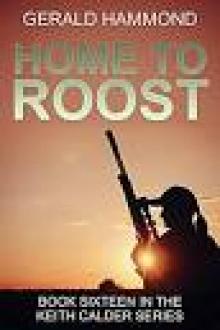 Home to Roost
Home to Roost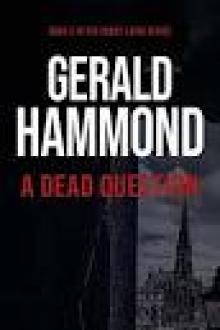 A Dead Question
A Dead Question Twice Bitten
Twice Bitten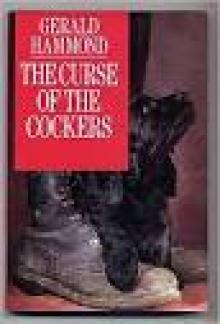 The Curse of the Cockers
The Curse of the Cockers In Loving Memory
In Loving Memory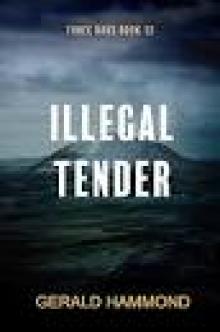 Illegal Tender (Three Oaks Book 12)
Illegal Tender (Three Oaks Book 12)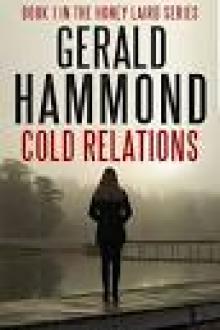 Cold Relations (Honey Laird Book 1)
Cold Relations (Honey Laird Book 1)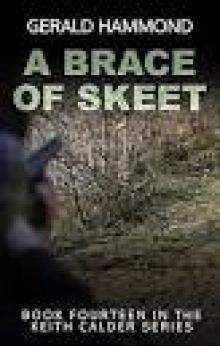 A Brace of Skeet
A Brace of Skeet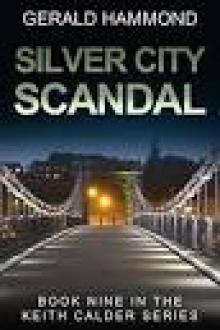 Silver City Scandal
Silver City Scandal Sauce For the Pigeon
Sauce For the Pigeon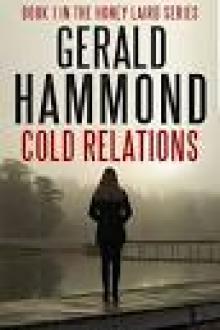 Cold Relations
Cold Relations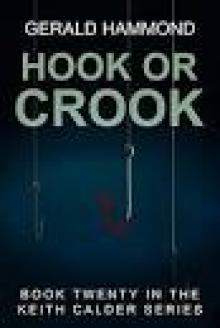 Hook or Crook
Hook or Crook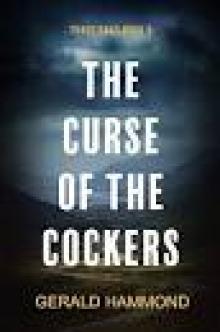 The Curse of the Cockers (Three Oaks Book 5)
The Curse of the Cockers (Three Oaks Book 5) Snatch Crop
Snatch Crop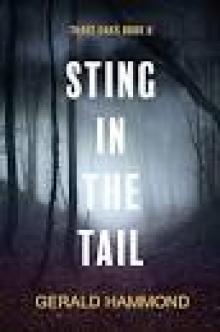 Sting in the Tail (Three Oaks Book 6)
Sting in the Tail (Three Oaks Book 6)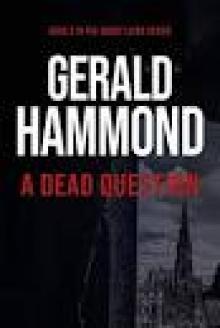 A Dead Question (Honey Laird Book 2)
A Dead Question (Honey Laird Book 2)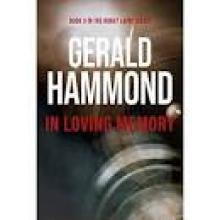 In Loving Memory (Honey Laird Book 3)
In Loving Memory (Honey Laird Book 3) Thin Air
Thin Air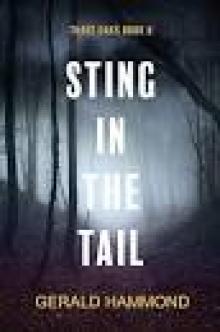 Sting in the Tail
Sting in the Tail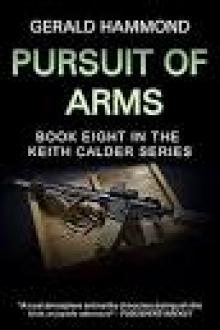 Pursuit of Arms
Pursuit of Arms The Game
The Game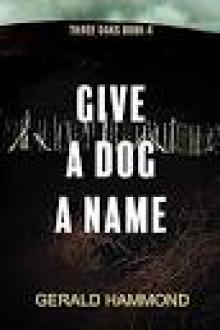 Give a Dog a Name (Three Oaks Book 4)
Give a Dog a Name (Three Oaks Book 4) Fair Game
Fair Game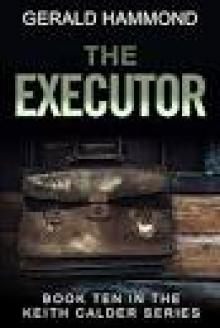 The Executor (Keith Calder Book 10)
The Executor (Keith Calder Book 10) Whose Dog Are You? (Three Oaks Book 2)
Whose Dog Are You? (Three Oaks Book 2)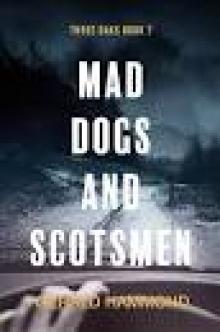 Mad Dogs and Scotsmen (Three Oaks Book 7)
Mad Dogs and Scotsmen (Three Oaks Book 7)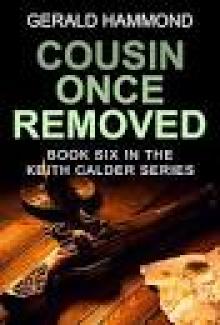 Cousin Once Removed
Cousin Once Removed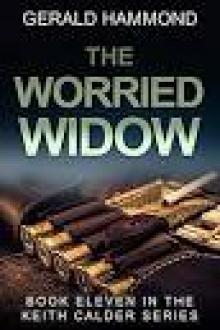 The Worried Widow
The Worried Widow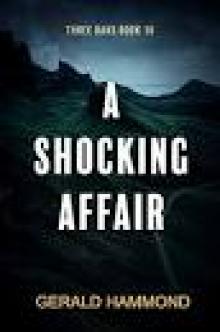 A Shocking Affair
A Shocking Affair Dead Weight (Three Oaks Book 11)
Dead Weight (Three Oaks Book 11) Whose Dog Are You
Whose Dog Are You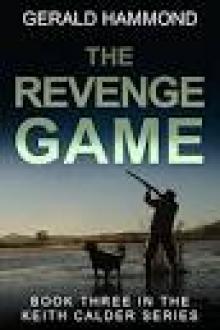 The Revenge Game
The Revenge Game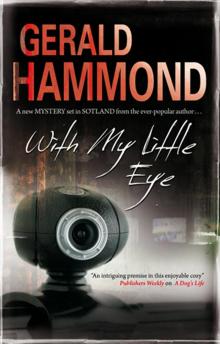 With My Little Eye
With My Little Eye Doghouse (Three Oaks Book 3)
Doghouse (Three Oaks Book 3)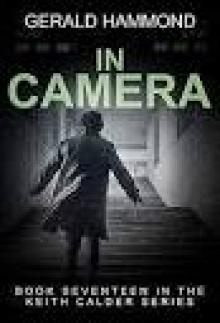 In Camera
In Camera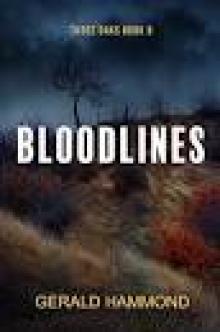 Bloodlines (Three Oaks Book 8)
Bloodlines (Three Oaks Book 8)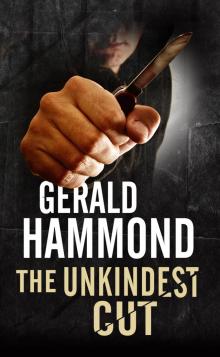 The Unkindest Cut
The Unkindest Cut